Early evening and candy cotton clouds sit above the mountains. How do they get to be so puffy and white? My elder daughter would know; she is a meteorologist. Yet I resist finding out. I like wondering.
Good job too, else I would never have packed up my life at the age of 54 and emigrated here to Skagit County, WA in the USA. I left a small village in West Wales in the UK. New adventures come knocking at my door and who am I to refuse the call?
What did I imagine my life would be like?
I really didn’t know how daily life would be. The vision: to build a life together with my American husband, explore inspiring landscapes, express creatively and engage with a new community whilst also strengthening bonds with our ever expanding family. What my roles would be? Unknown.
Having lived in many different places, I understand that I take myself with me wherever I go. You can be in the most beautiful place and be preoccupied with thoughts in your head. Conversely you can be in a cold grey place and feel the warmth of love in your heart. A fresh start nonetheless.
A love affair with porches
One thing I particularly love here in the US, are the porches. A place to sit and take in the world, chat with neighbours or dream. I have a book called Preserving Porches by Renee Kahn and Ellen Meagher. From the back cover:-
“Whether you call it the terrace or the veranda, the portico or the loggia, the porch is an American icon.”
As well as giving detailed instructions on how to preserve or restore your porch, the book provides a detailed history of porches in the US.
Just this morning, my Mum was talking about the loggia on her childhood home near Reading, UK. We’ve been watching cine film of her and her cousins and aunties playing jump rope (skipping) in the garden circa 1954. She was fourteen. I watched this vibrant teenager jump and fist pump in wonder. A young girl I never met. The young girl my mother once was. The opposite of catching a glimpse of a ghost. The very scarcity of such images, makes this unearthed treasure precious.
I rarely hear the word loggia yet here it was. I learn it is a room, corridor or porch open to the air on one or more sides. Usually the outer wall is partial. It is an Italian word. Such structures are popular in the Mediterranean where protection from the sun was desirable. A romantic word for a porch.
My love of porches is perhaps an inheritance from my grandparents. When they retired down to a coastal village in Cornwall, that house too had a sun loggia. I remember it well and still have a scrap of fabric from the seat cushions.
True porches are rare in the UK and Northern Europe generally. A porch, if it exists at all, is usually a small covered extension over the front door of a house. Typically it houses boots and coats and shelters you from the rain as you disrobe. It’s a thoroughfare, not somewhere to sit and stare. Usually windowless it is all about keeping draughts out of the house in the days before central heating. On newer builds there may just be a canopy.
Much more common are patios or decks at the back of the house facing onto the garden. Decking is common here too.
Deep wrap around porches delight me, with space for sofas, rocking chairs or a hammock. For fabulous porches, watch the film, The Notebook (great score by the way) directed by Nick Cassavetes, from a screenplay by Jeremy Leven and Jan Sardi, and based on the 1996 novel of the same name by Nicholas Sparks. It stars Rachel McAdams and Ryan Gosling.
Here in Skagit County I always have my eye out for beautiful porches. To me, they say, come, hang out, listen to the birds, tarry a while and let your mind wander. Sit and visit (as they say here), meaning sit and chat, shoot the breeze.
Here’s a little gallery of porches. I don’t like to zoom in on other people’s houses so you’ll have to imagine the porch furniture.
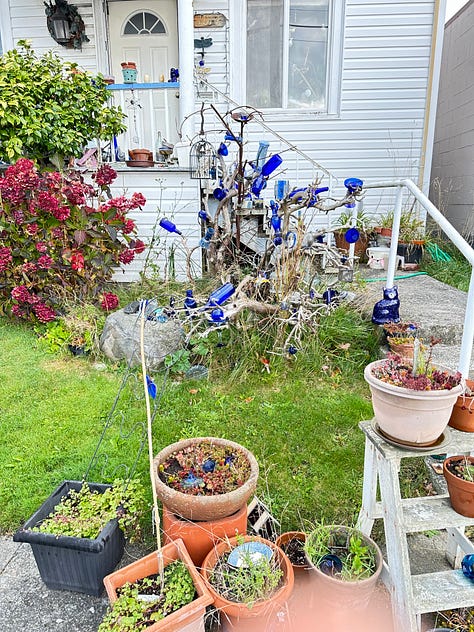
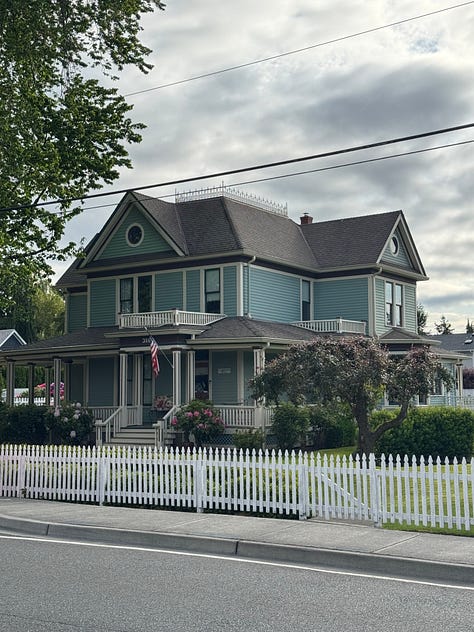
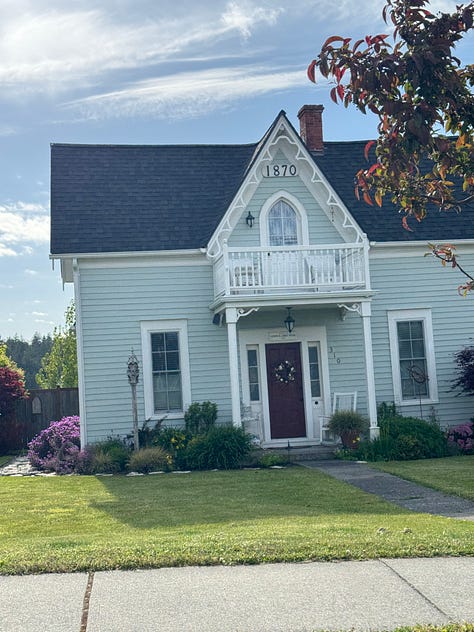
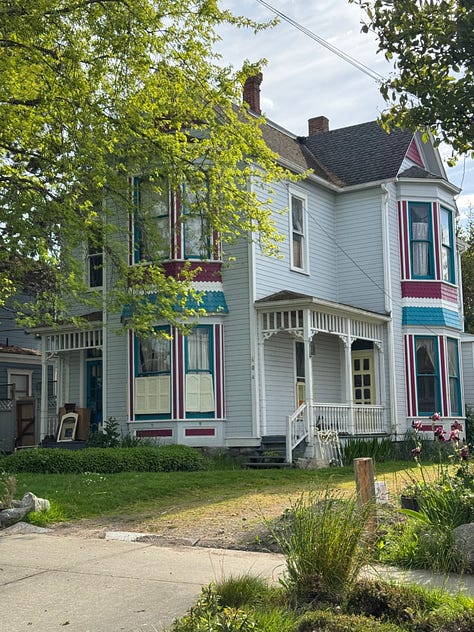
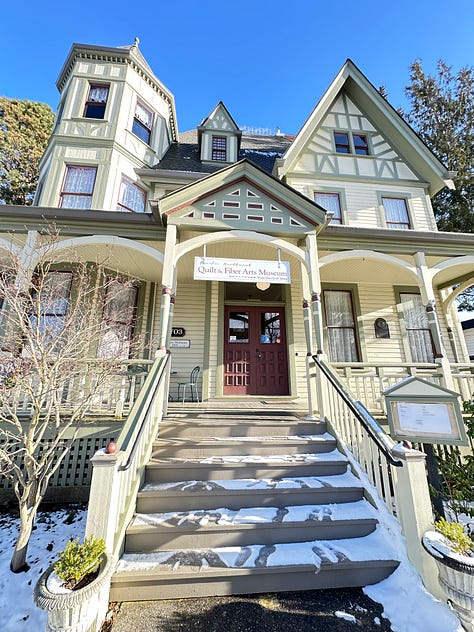
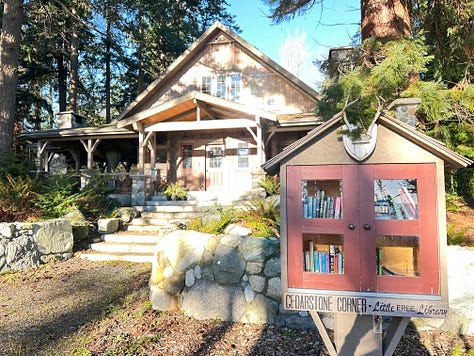
Who knows? A dreamy porch may be in my future. Not knowing is such rich territory.
The unknown: a fertile space
Not knowing is just such a great place to hang out. Got a problem or a dilemma? Finding something hard and frustrating? Forget about it and go enjoy yourself. Leave your unconscious mind to percolate.
What you need to see, understand or know will show up at the perfect time if you just relax, stop trying to figure it out and let wisdom show up on its own timetable.
You have to keep your eyes and ears open though lest you miss wisdom when it arrives. That happens when we get fixed ideas about what the solution must look like.
I forget this all the time. But then I remember and it’s beautiful. I was thinking it would be great to find a community garden someplace near by where I could lend a hand now and then. I forgot about it. Last week an email showed up from a friend, forwarding me a request for volunteers in a community seed garden on one of the islands. Just like that, an answer arrived. That reminds me of a story I once heard.
❦
There was a man trapped by rising floodwater who fervently prayed to God to rescue him. “Lord, I am your humble servant, please rescue me from this terrible flood.” He was interrupted by shouts from two men, wading through the floodwaters. “Come, we’ll help you through the water, but we have to go now.” “No thank you” he replied. ‘My God will save me.” The men went away. The floodwater was rising. He went upstairs and fell on his knees praying harder, “In your mercy, save me oh lord.”
He heard shouting and went to the window. Below a man in a small boat called out, “come down, I can row you to safety.” “No, thank you,” said the man, “my God will save me.” The boat rowed away. The waters rose up to the windowsill. He shut the window and went up to the attic, praying all the while. Overhead, the sound of helicopter blades was deafening. He opened the attic window and saw a woman was climbing down a ladder hanging from the helicopter, hovering nearby. As she got closer, she shouted, ‘hurry, we don’t have much time, take my hand and we can get you out of here.” “No thank you, my God will save me.” The helicopter turned and flew away. The waters rose and swallowed up the house and the man who drowned.
When he reached the Pearly Gates, St Peter was waiting for him. Still drenched from the flood waters, he asked, “why did God forsake me in my hour of need?” Peter said, “he sent two helpers, a boat and a helicopter, what more did you want, a winged chariot?”
The unknown is nothing to fear because you only need to deal with what is in front of you. And if you let your mind settle, you’ll know what to do or not do in this next moment. So you can stop fretting and exhausting yourself. Relax and enjoy what there is to enjoy and remember to be amazed and grateful when answers show up. Never get used to the miracles.
The things that pull you, light you up, the things you dream about, pay attention to those. You never know how they may expand and develop in your life if you give them room. I’m making space in my imagination for a beautiful porch!
Questions
When have answers or solutions shown up when you’re not thinking about them?
What might happen if you stop thinking about problems and let answers come in their own good time?
Do you have a porch? Tell me about it. Paint a picture of life on your porch, what do you use it for? Or share a photo if you wish.
❦
Threads that pull me
A section for what I’m reading, watching or listening to or ideas that intrigue me.
The Mindful Day by Laurie J. Cameron (affiliate link*). The author breaks your day down into micro moments and gives you research backed ideas and practices to bring more mindfulness into your home and work life from the moment you wake until you fall asleep. I like to cherry pick a book like this. I loved the few pages on music, they’ve had me returning to old favourites and exploring new (to me) music.
‘Music can train attention and awareness, shift your mood, and unleash joy.’
Resting my back had me binge watching Netflix shows.
Series: Four Seasons - poignant, funny, some great lines.
Film: Sirens - didn’t see the twist at the end coming
Younger - multiple series. Watching as a writer: fascinated at the preposterous premise and how it yielded so many episodes.
My Writing Life
Do I need to be in a particular state of mind when I write?
No. My state of mind varies. Usually not an issue except when it is!
For this publication I sit down on a Monday or Tuesday and begin the draft. An idea has either already surfaced or it does as I begin to type. So far, writing An Englishwoman with her camera in Skagit County, WA, is nourishing and enjoyable so I find the words come easily and I’m usually in a relaxed state of mind. I enjoy it.
Later in the week, I approach editing with a pretty clear head if the ideas and structure are sound. Sometimes it’s a quick task. Other times I develop the original ideas further.
I can get bogged down and overwhelmed at the thought of editing writing that feels bloated or aimless. Which is where my novel is at the moment.
In the early months of writing my novel, the story poured out of me and felt easy, joyous. I came to each day’s writing with eager anticipation. Nowadays not so much. I have a ton of obstructive thinking; it’s like pulling teeth. It’s a delicate balance to know when to sit down and write anyway, even if I hate it and when to leave it alone and let fresh ideas surface. I am learning about this.
Editor’s note: after a great conversation with my writing buddy Susan, I am feeling enthused about my novel once again.
Any questions you’d like me to answer about my writing life? Message me or comment below.
❦
How I know ‘we’re not in Kansas anymore Toto’
A regular slot for things that catch my eye and tell me I’m no longer in Ferryside, West Wales, UK.
I’ve read about North American berries in Robin Wall Kimmerer’s book, Braiding Sweetgrass. Imagine my joy as I get to see them in the wild in nearby Kukutali Preserve. Salmonberry, Snowberry, Thimbleberry, Osoberry and Red huckleberry. The names are like poetry. There are familiar faces too: blackberries and wild strawberries.
Read this beautiful sharing of indigenous knowledge of salmonberries and salmon, Thriving Together: Salmon, Berries, and People, by ‘Cúagilákv (Jess Houst)
The salmonberry plant has nourished and healed Indigenous communities of the Pacific Northwest coast for countless generations, but its significance goes far beyond its value as food.
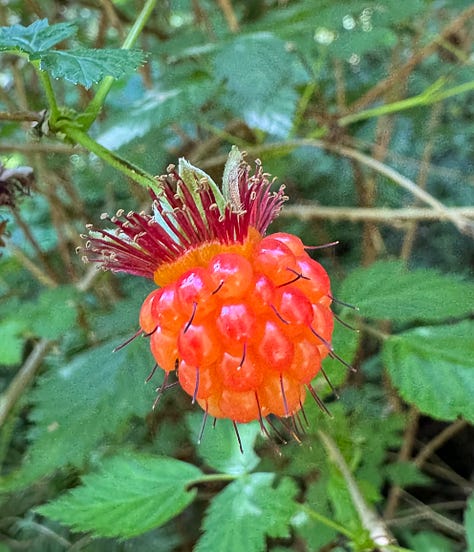
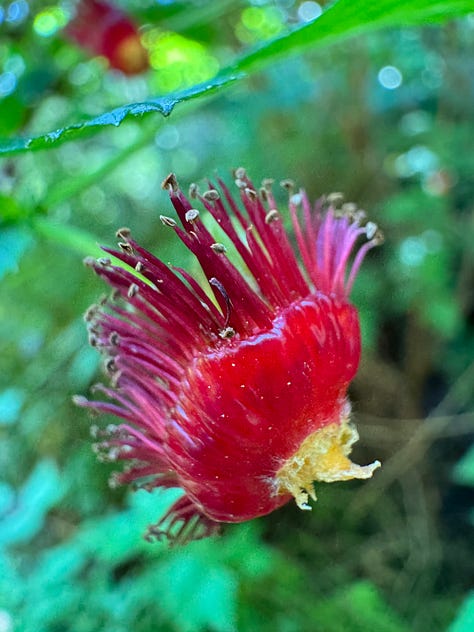
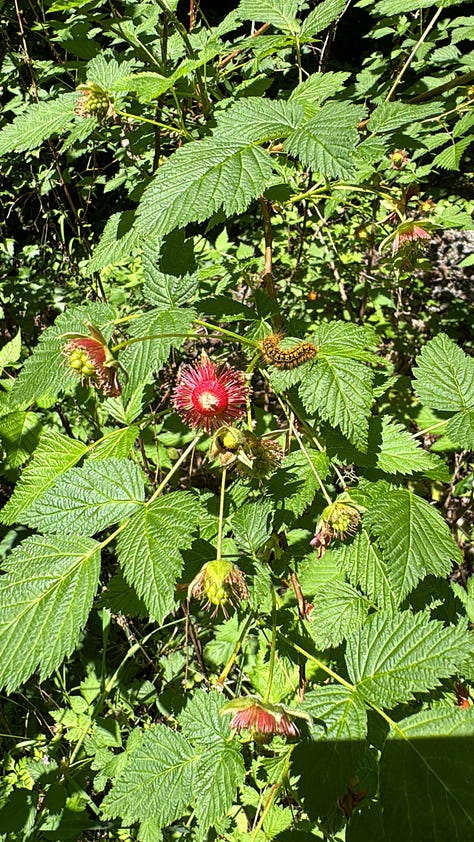
That’s all folks. Thank you for being here. Press the little ♥️ if you were amused, educated or inspired. Share or restack the post to help build community and connections.
‘Til next time.
Juliet Fay
Find more of my writing elsewhere
Book: A Life Less Serious: Real life stories from women to inspire, uplift and encourage new perspectives on living by George Halfin. My essay, The Gift of Travel closes the book. (affiliate link*)
Digital publication: Hope - A Scrapbook by Catriona Knapman, author of Notes from Saving the World. My poem, Hope for the Family is included.
*Affiliate links: I earn a small commission if you purchase a book from Bookshop.org after following the link. You don’t pay any extra. Bookshop.org provides online selling services for independent bookshops.

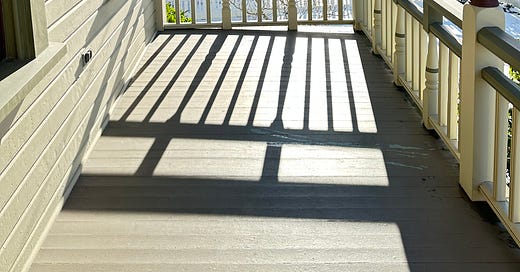


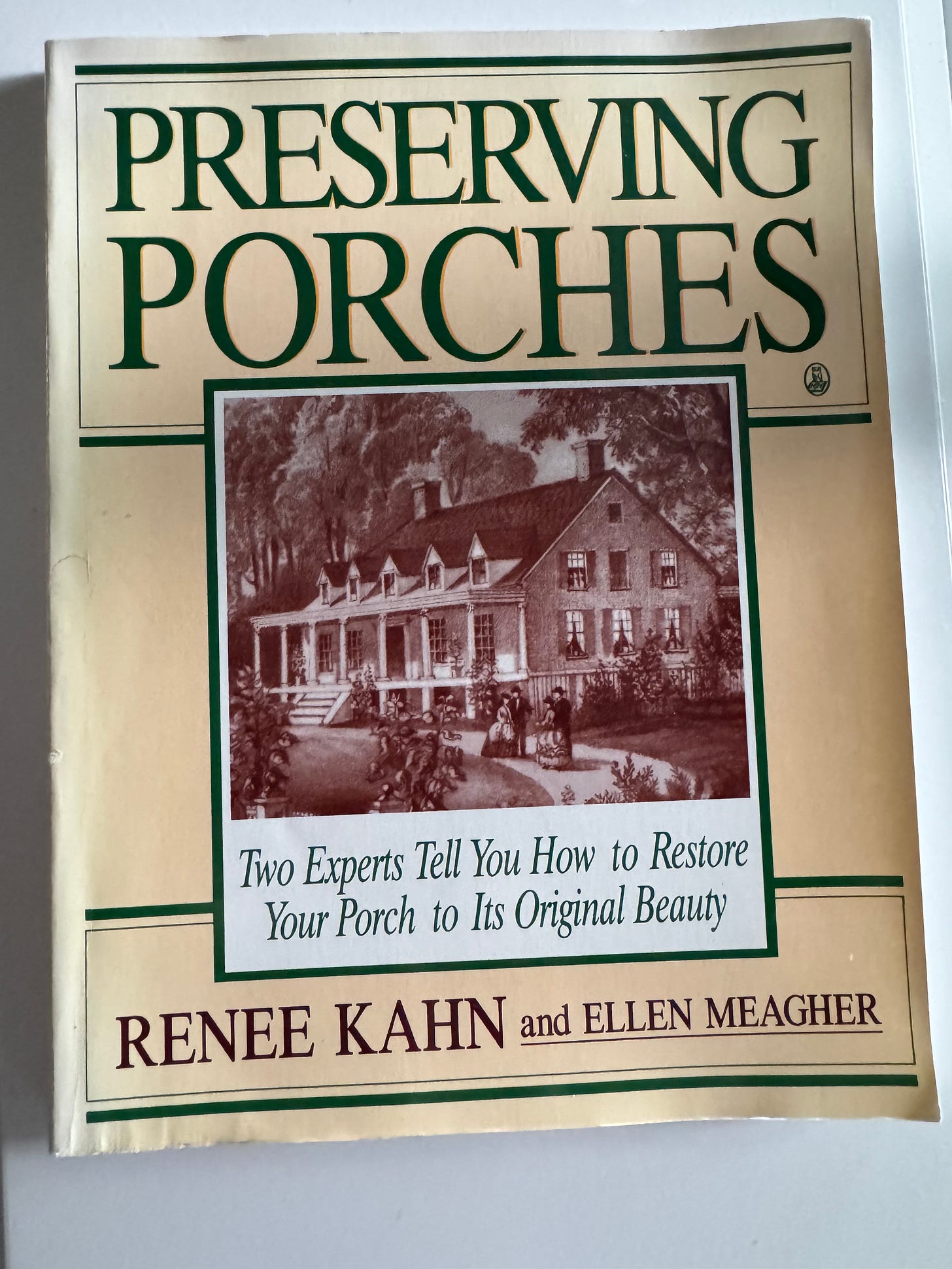
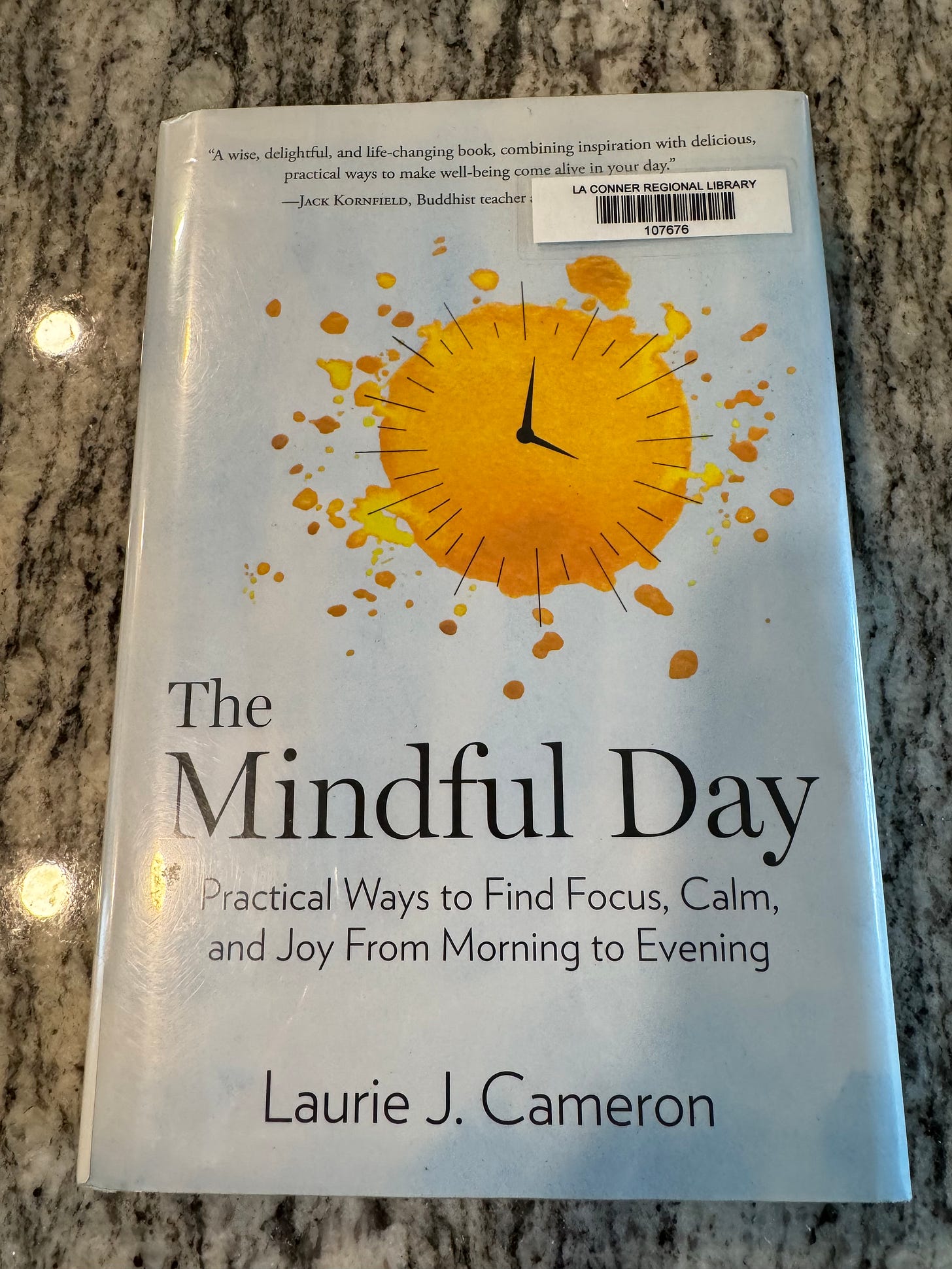
I have such a longing for a porch... I believe I am a porch-sitter in my soul (but aren't we all? ;) I really enjoy your reflections and your guided tours of Skagit County. A nourishing start to my day!